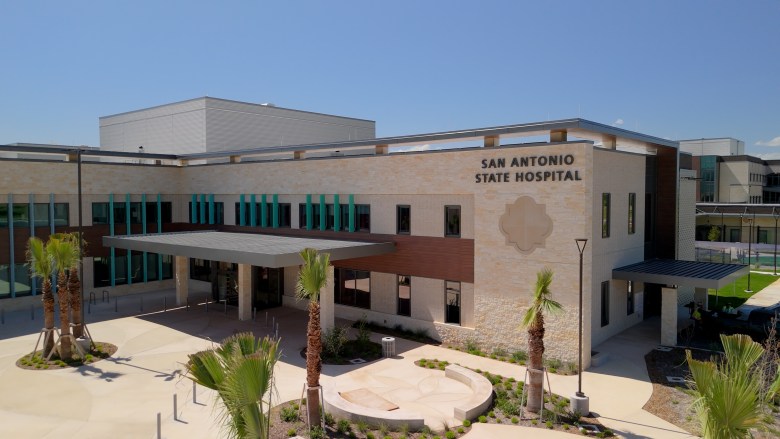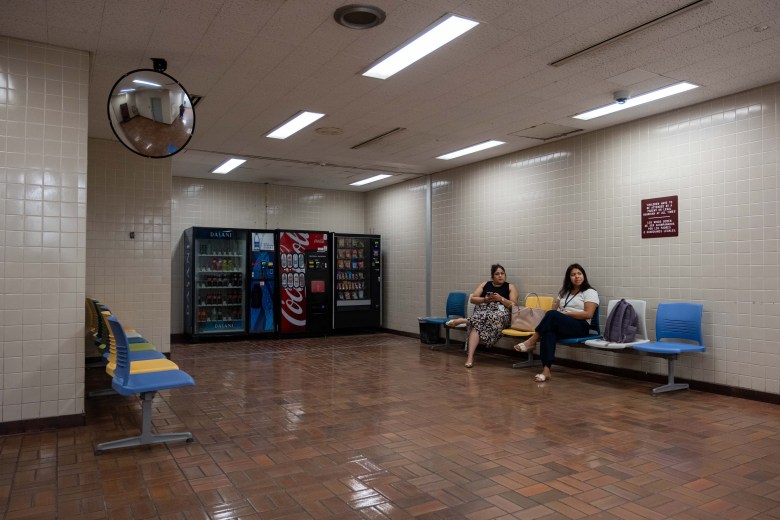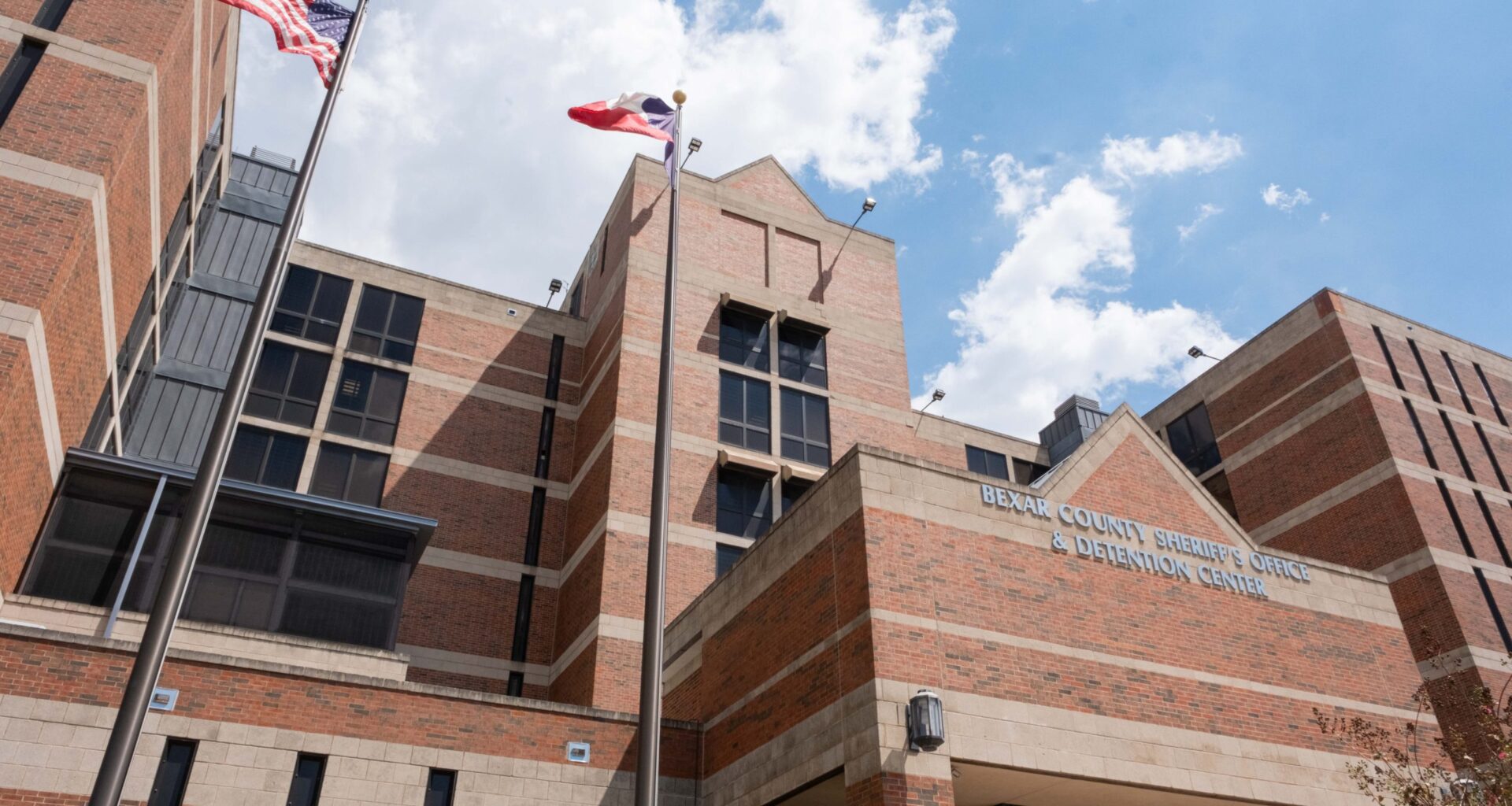On any given day in the Bexar County Jail, over 100 inmates aren’t waiting for a lawyer or a court date. They’re waiting for a hospital bed.
Some have already spent months behind bars, found incompetent to stand trial and struggle with mental illness. Stabilized with medication inside a cell, they remain in limbo because Texas doesn’t have enough forensic psychiatric beds — secure hospital beds reserved for criminal defendants who need mental-health treatment before their case can move forward.
In Texas, a defendant is deemed incompetent to stand trial when a judge finds they can’t understand the charges or help their attorney due to mental illness or intellectual disability. This pauses the case until competency restoration — the treatment process that uses medication, therapy and court-education to return someone to trial readiness — is completed, which usually happens in a state psychiatric hospital.
But space is tight and the wait is long.
Data from the Texas Health and Human Services Commission shows that between August 2024 and August 2025, an average of 2,058 defendants statewide were on the forensic hospital waitlist each month. In Bexar County, the monthly average was 152.
Those numbers cover three groups: maximum-security patients — often defendants with violent charges who require the most restrictive hospital setting; non-maximum-security patients, including people jailed on lower-level offenses, including misdemeanors; and individuals found not guilty by reason of insanity.
The average wait time across Texas is staggering. In Bexar County, the average waits are 287 days for maximum-security inmates. And for non-maximum-security inmates it’s 277 days, which is about a month longer than the state average.
In Texas, the maximum sentence for a Class B misdemeanor is 180 days in jail; for a Class A, up to one year. For some non-maximum-security defendants found incompetent on misdemeanor charges, the wait for a hospital bed can be longer than the sentence itself.
When that happens, defendants legally time out — reaching the maximum period of confinement without being restored — and cases are dismissed, often with referrals to civil or outpatient treatment.
With so many stuck in this cycle, much of the responsibility for mental health care falls back onto the jail itself.
Currently, the county’s mental health authority, Center for Health Care Services (CHCS), and the county hospital district, University Health, run the mental health services inside the facility, beginning with screenings as soon as a person is booked.
At the Justice Intake and Assessment Annex, CHCS provides mental health screenings. Every inmate is asked about past diagnoses, hospitalizations and treatments. When an inmate leaves the annex to be housed in the jail, CHCS communicates their needs to University Health staff, which then assumes their care.
University Health initiates treatment plans at booking — often continuing existing prescriptions and making referrals to psychiatry providers inside the jail.
It’s a huge operation. The jail has 52 acute mental health beds and 348 stable mental health beds, and on an average day, about 550 inmates are under mental health care, according to data provided by University Health.
 The entrance to San Antonio State Hospital on the city’s South Side. Credit: Courtesy / Texas Health and Human Services Commission
The entrance to San Antonio State Hospital on the city’s South Side. Credit: Courtesy / Texas Health and Human Services Commission
That means the jail is treating more patients each day than the newly rebuilt San Antonio State Hospital, which opened in April 2024 and has 268 online beds out of its planned 300. The remaining 32 beds are offline or not in use due to construction, maintenance, staffing and other issues, according to state officials.
For defendants found incompetent to stand trial, that care continues inside the jail while they wait for a state hospital bed.
“Patients awaiting competency restoration are treated by psychiatric providers who devise treatment plans that include psychiatric visits, medications, assessments and diagnostic testing,” said Elizabeth Allen, University Health’s director of external communications in an email.
As of Aug. 12, University Health reported 145 inmates in the Bexar County Jail were waiting for a forensic bed in a state hospital. County officials have turned to a stopgap: a jail-based competency restoration program meant to keep defendants from languishing on the waitlist.
Two years ago, CHCS launched the first such program in Bexar County aimed at restoring defendants to competency inside the jail rather than waiting months — or even years — for a hospital transfer.
“When we first started the program back in 2023, there had been folks that had been here for a year and a half, two years,” said Nicole Bermejillo, clinical administrator of the program. “Just simply waiting to get to the state hospital.”
The program began serving up to 12 people. With federal grant money and later state funding, CHCS expanded the program in 2024 to include women in the annex and up to 18 participants at a time.
Bermejillo said the results show progress. “This past fiscal year, we served 61 individuals,” she said. “Out of those, 35 were either restored or had their charges dismissed — 31 restorations and four dismissals. Our average restoration rate right now is about 55%, which is also the state’s standard.”
On average, defendants in Bexar County’s jail-based competency program spend about 95 days from the time they are court ordered into the program before being restored or having their cases dismissed, Bermejillo said.
By contrast, defendants with court orders for competency restoration to state hospitals spend an average of 240 to 300 days just waiting for a bed to open up before treatment even begins, according to HHSC data.
Participants in the county program remain on the state waitlist just in case they need to be transferred later — ensuring they don’t lose their place.
Even with those gains, the program faces limits. Its cap of 18 participants is a drop in the bucket compared with the nearly 150 inmates waiting for competency restoration.
And while it has shown success with felony cases, it has yet to restore a single misdemeanor defendant.
“We have not yet restored successfully, a misdemeanor,” Bermejillo said.“ We’ve actually worked really closely with the district attorney’s office to get some dismissals for those misdemeanors and coordinating entry with them into civil outpatient commitments to continue mental health treatment in the community.”
With the jail-based program only reaching a fraction of the people waiting, some advocates say the very idea of restoring competency inside a jail points to a deeper flaw in the system.
“This is not mental health care — it’s just stabilizing people enough to get them through court,” said Krishnaveni Gundu, co-founder and executive director of the Texas Jail Project, a nonprofit organization that advocates for and with people incarcerated in Texas county jails and their loved ones.
 High turnover and incarceration rates have been putting strain on the Bexar County Sheriff’s Office and jail. Credit: Amber Esparza / San Antonio Report
High turnover and incarceration rates have been putting strain on the Bexar County Sheriff’s Office and jail. Credit: Amber Esparza / San Antonio Report
She described Texas jails as the state’s “de facto psychiatric institutions,” housing thousands of people who might otherwise be treated in hospitals or community programs.
Gundu warned that expanding jail-based programs risks deepening that trend.
“Instead of investing in crisis centers and step-down facilities in the community, the state is pouring money into jails,” she said. “We’re criminalizing illness, homelessness and poverty, and then asking correctional officers to manage conditions they were never trained to treat.”
She added that long waits for competency restoration exemplify how the system punishes people for being sick rather than offering timely care.
“We’ve built a revolving door where people cycle through jails,” Gundu said.”They get just enough treatment to go back to court, and then return again when their illness flares up.”
Her critique comes as state officials point to new capacity on the horizon. The state is working to add 193 new forensic psychiatric beds across Texas, including 70 in rural communities.
Still, the average statewide forensic waitlist has hovered above 2,000 people a month for the past year — including more than 150 from Bexar County alone.

